Picture this: You’re finally on vacation. You’ve just landed in whatever dream destination you might have decided upon, and you’re waiting for your checked-in bag to arrive so you can get things started. But your luggage arrives damaged and potentially unusable, as someone at one of the airports didn’t pay enough attention (or care) when handling your bag. It ruins your travel plans, especially if you’ve just bought a new set of bags for this specific trip.
The first thing you should do is to report the damage immediately at the airport. You should be compensated for the damage, as the airline that flew you from point A to point B has to get you there safely. It also has to get your luggage safely to your destination. After all, they probably charged you extra for that checked-in bag to begin with.
The second thing you should do is prepare mentally for that airline to disappoint you initially by refusing compensation or offering a solution that’s hardly accommodating. I’m looking at you, Lufthansa, but this can easily be any of the major airlines looking to save a buck while pretending they’ll help you.
Finally, once you’re done with that vacation, you should use ChatGPT to find help. ChatGPT will not get your money and won’t fight on your behalf. But you can use ChatGPT Deep Research to find information on cases similar to yours, and that might come in handy.
I did travel a bunch recently, but my checked-in luggage did not suffer any damage beyond the scratches and scuffs that checked-in bags usually get. These are unavoidable unless you use some sort of protective material.
However, a friend’s checked-in luggage was damaged during a Lufthansa flight. It was a brand-new bag that suffered actual damage. By actual damage, I mean actual parts of the bag coming off or visible dents. Again, scratches do not qualify. Lufthansa acknowledged the damage initially, but then the back-and-forth email ordeal followed.
That’s where I decided to use ChatGPT Deep Research to help. I found that many people flying with Lufthansa initially faced resistance from the airline when seeking proper compensation for luggage damage. But those who are persistent and know their rights will eventually get it.
While I won’t give you details about the actual matter, I will show you screenshots from my Deep Research chat with ChatGPT on how Lufthansa has treated passengers with damaged luggage in the past. I used a Deep Research report for Lufthansa because I was interested in this specific airline. But you can replicate Deep Research using other companies if you’re dealing with similarly annoying behavior.
I’ll also warn you that AI like ChatGPT can hallucinate information, and the links it offers won’t always work. You’ll need to keep chatting with the AI after the report is done to ensure you have your data in order.
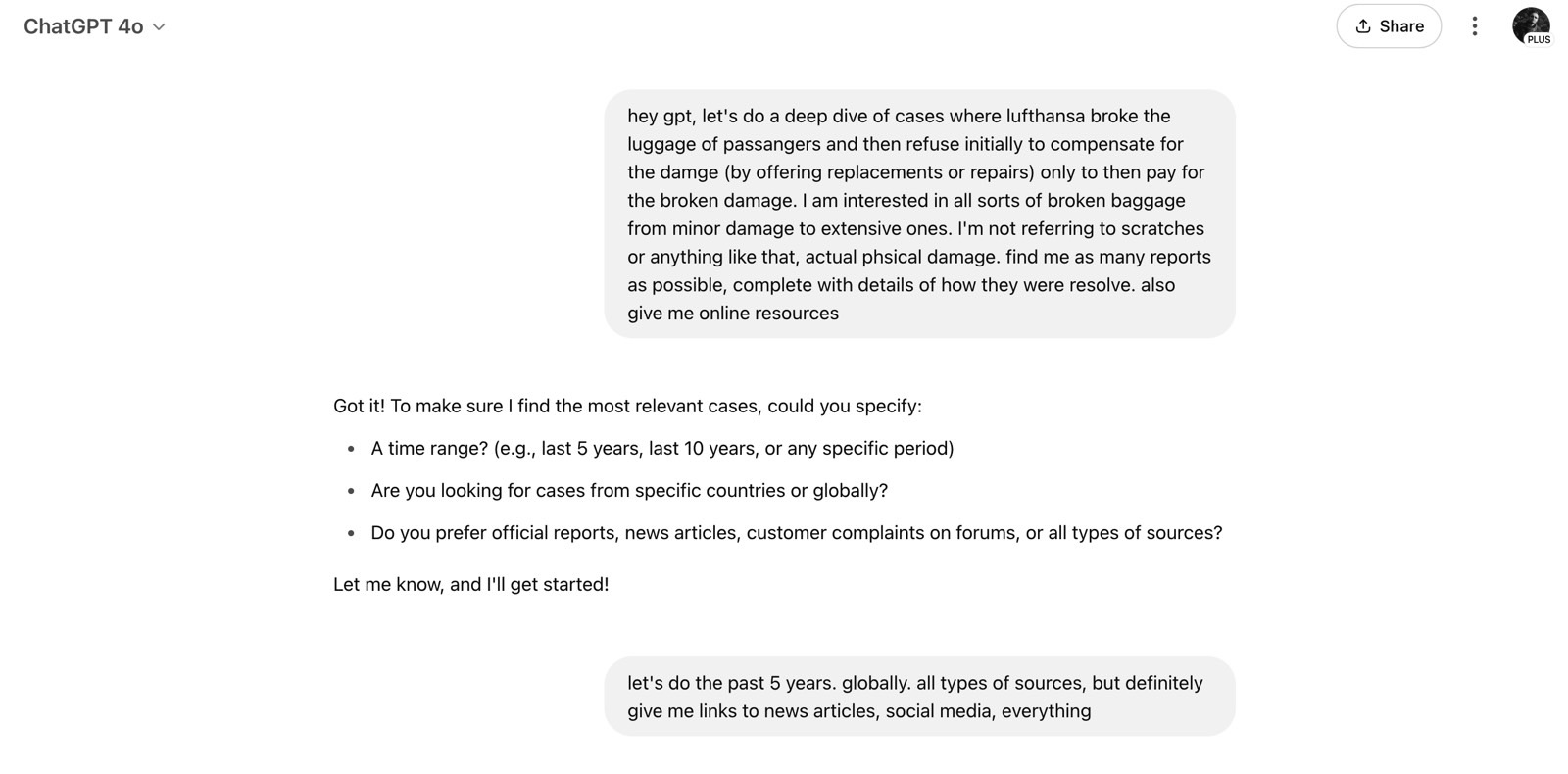
However, ChatGPT will deliver detailed, well-sourced Deep Research reports that could be a great stepping stone toward making your case against Lufthansa or any other airline. Because, yes, you might take them to court.
I asked ChatGPT for a Deep Research report on Lufthansa’s behavior towards customers with broken luggage claims to see how the airline generally handles these matters. The AI asked supplemental questions, and I gave it a timeline, telling it to look at global cases and surface everything it could find.
After a few minutes spent researching the web, ChatGPT gave me a detailed report.
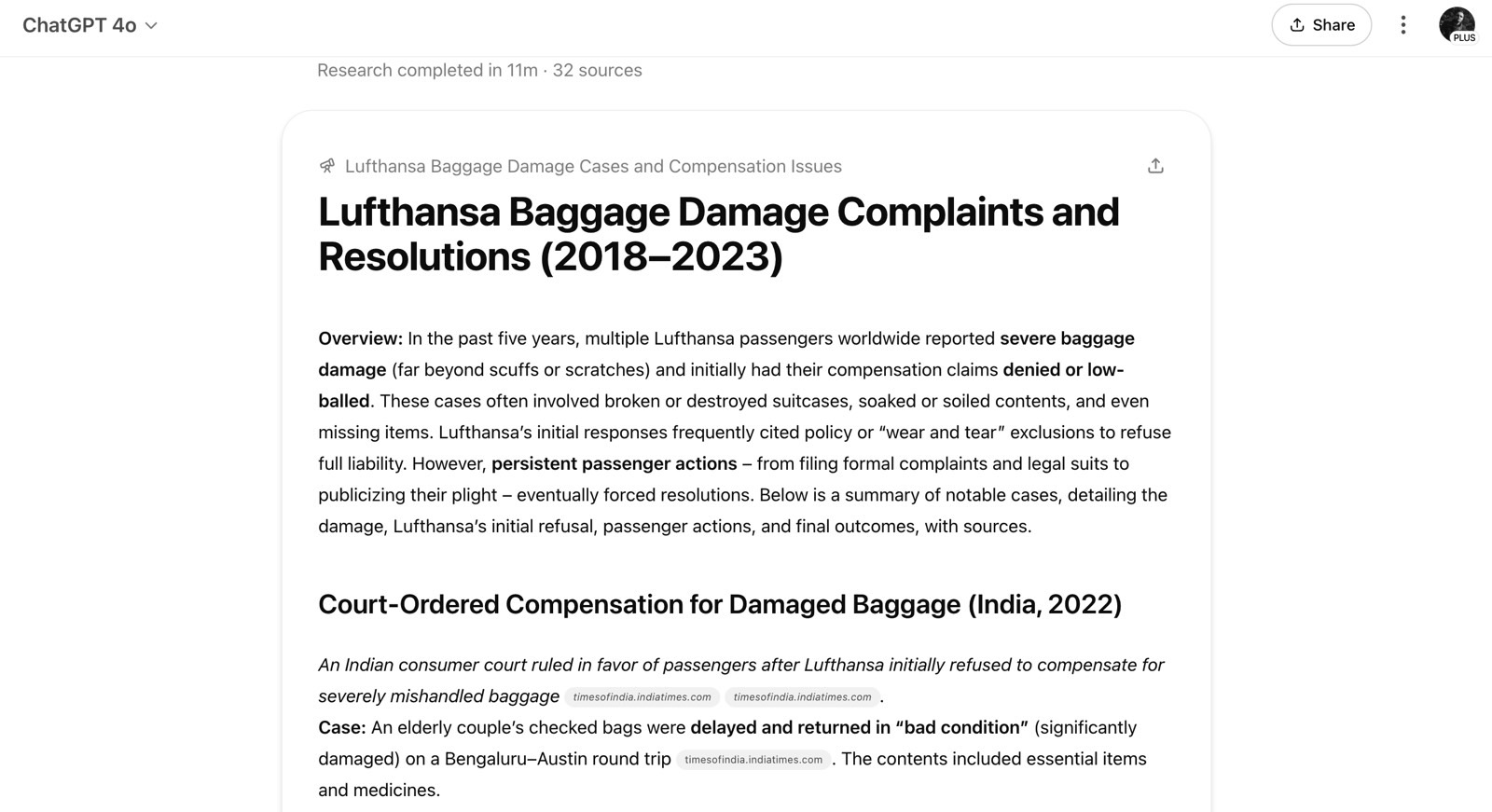
Unsurprisingly, ChatGPT told me that Lufthansa routinely refuses full liability for damaged luggage, citing wear and tear exclusions. However, persistent action from passengers, including suing Lufthansa, led to full compensation.
The report also highlighted a common Lufthansa practice regarding damaged luggage. The airline routinely defers these cases to a subcontractor called Dolfi1920, which offers passengers replacement schemes involving bags of questionable provenance or minimal compensation offers.
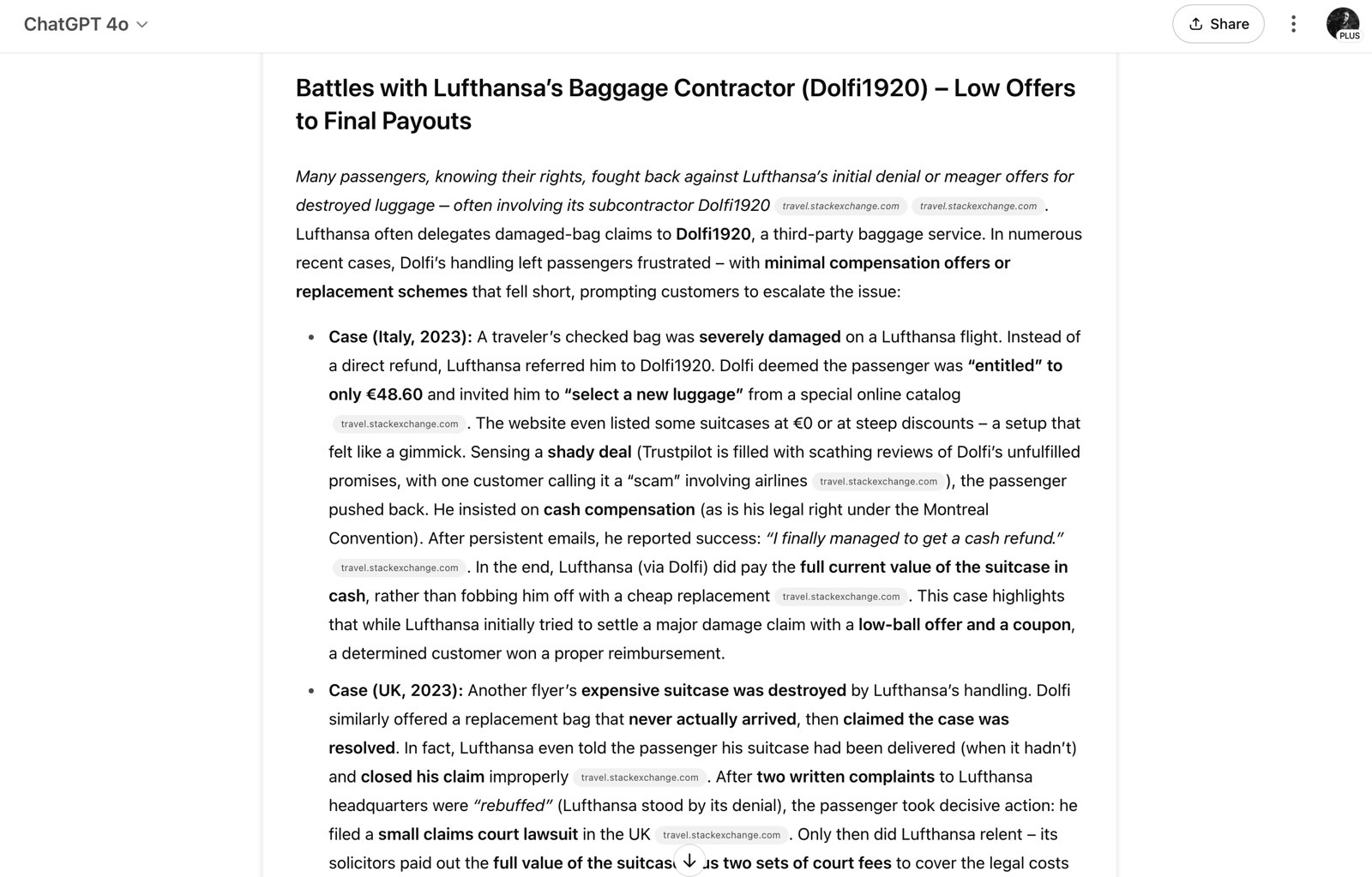
Some travelers who had to deal with these shady deals outright refused compensation, knowing they were entitled to cash compensation under the Montreal Convention. What’s the Montreal Convention, you ask? I had no idea about it either.
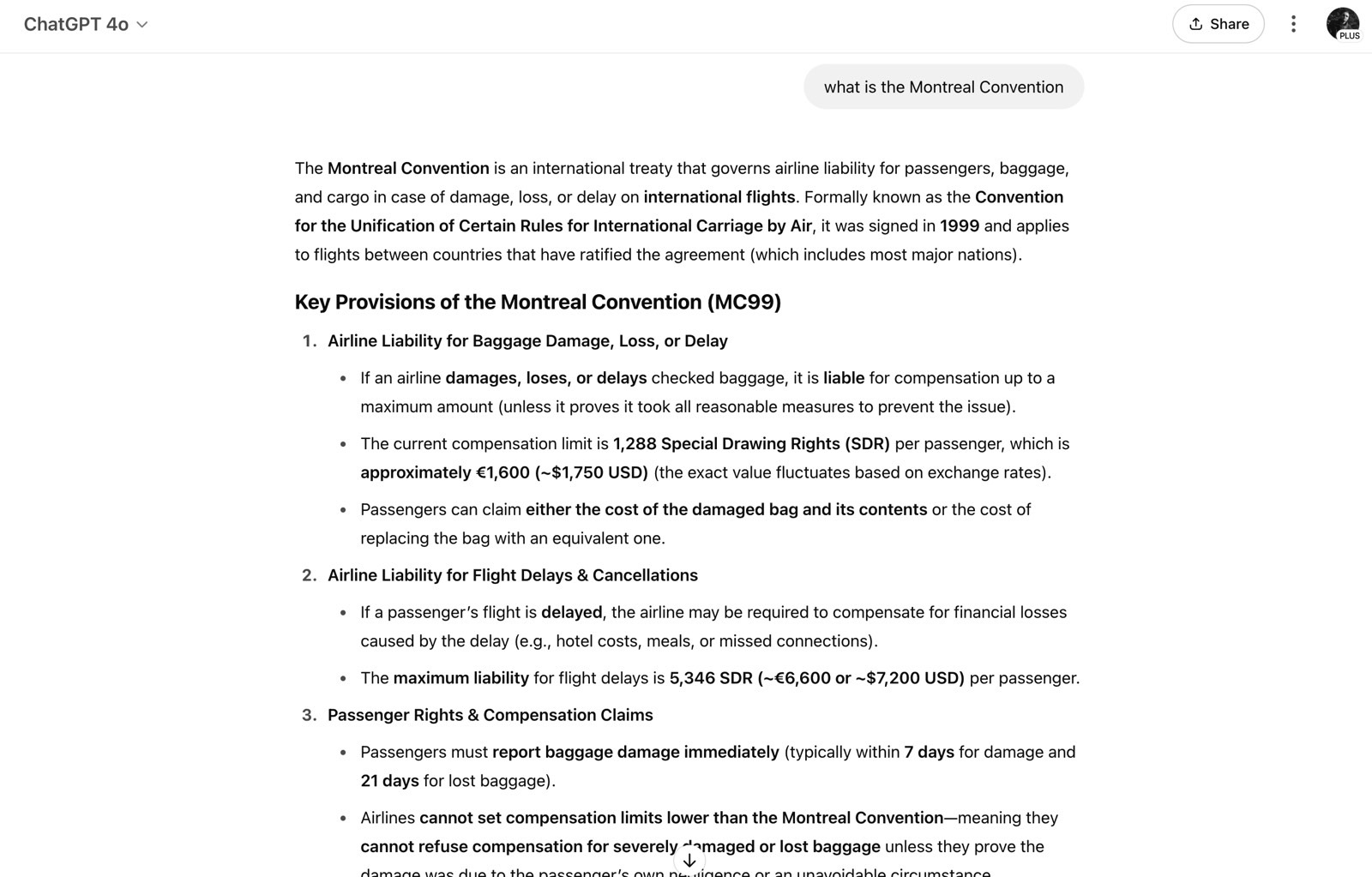
After the Deep Research was done, I asked ChatGPT questions about it. I found that it’s an international treaty meant to protect passengers’ rights when flying commercially with checked-in luggage.
Interestingly, Lufthansa has a portal on lost and damaged luggage where it lists the following answer to a FAQ question, after mentioning the Dolfi1920 solution. That answer specifically says that passengers have the right to refuse the solution Dolfi proposes and ask for full compensation in cash:
If you reported your damaged baggage online, our service provider Dolfi1920 GmbH will check your report and assess the damage. Dolfi1920 GmbH will then notify you as to whether you should send your bag for repair or receive a voucher. You can use this voucher to select a new bag via the Dolfi1920 GmbH website. You will have to pay the difference if you choose a bag that is more expensive than the value of the voucher.
If your bag cannot be repaired or replaced, or if you refuse this, you will be compensated for the current value of your bag. Fifteen per cent will be deducted from the original price for each year and part thereof of use, up to a maximum deduction of 70 per cent.
Despite the quote above, Lufthansa (and/or Dolfi1920?) actively chooses not to reimburse users, at least initially. The ChatGPT Deep Research report makes that clear.

But ChatGPT gave me specific examples of Lufthansa eventually having to pay despite initially refusing. Cases from India, Italy, and the UK surfaced in the report, showing that determined customers will force Lufthansa to pay.
It gets even better. The ChatGPT report surfaced a 2019 US Department of Transportation investigation of Lufthansa, which resulted in a fine for short-changing customers on baggage compensation. Also, ChatGPT found that damaged luggage claims that go viral on social media will have a chance of success when dealing with airlines like Lufthansa.
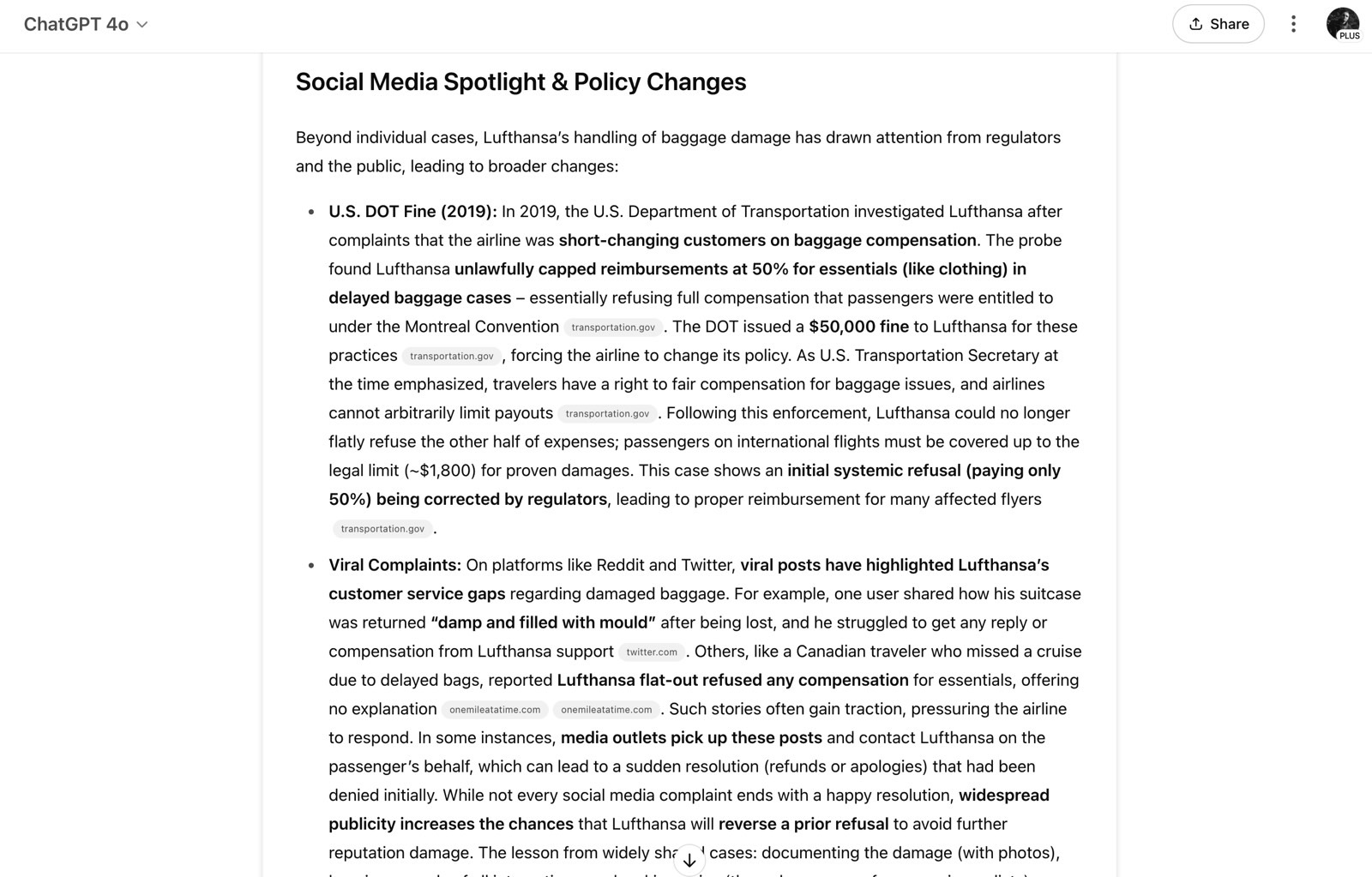
After the ChatGPT Deep Research was done, I continued my chat with the AI, and ChatGPT gave me tips on how to file legal claims under the Montreal Convention with Lufthansa. ChatGPT also listed escalation options, providing suggestions for contacting the aviation authorities under whose jurisdiction the luggage had been lost. It may be Germany, the EU, the US, or the UK, but you’ll find a place to start.
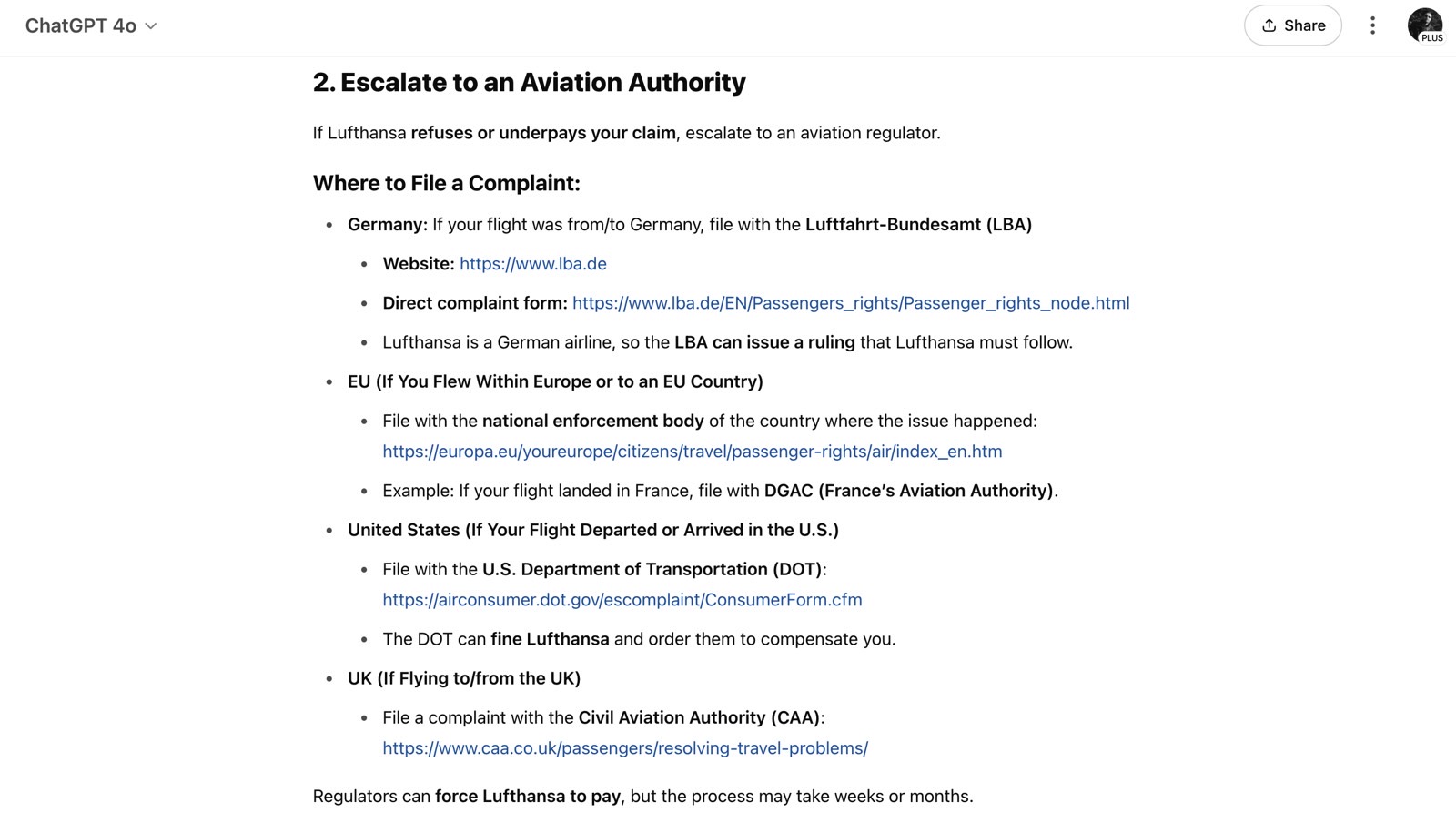
ChatGPT even asked if I wanted a template letter to send to Lufthansa or the courts. Of course, I did.
Within a few minutes, ChatGPT had searched the web for me for relevant cases, and I was already talking about options. It was clear that Lufthansa was in the wrong in my friend’s case and that accepting any nonsense involving Dolfi case replacements and coupons wasn’t advisable. Instead, persistence and potential legal action would yield better results.

ChatGPT Deep Research saved me a lot of time on a problem I didn’t even have myself. This is a great use of AI, as it can help you figure out your options much quicker after realizing you’re not alone. What Lufthansa is doing to you happened to others.
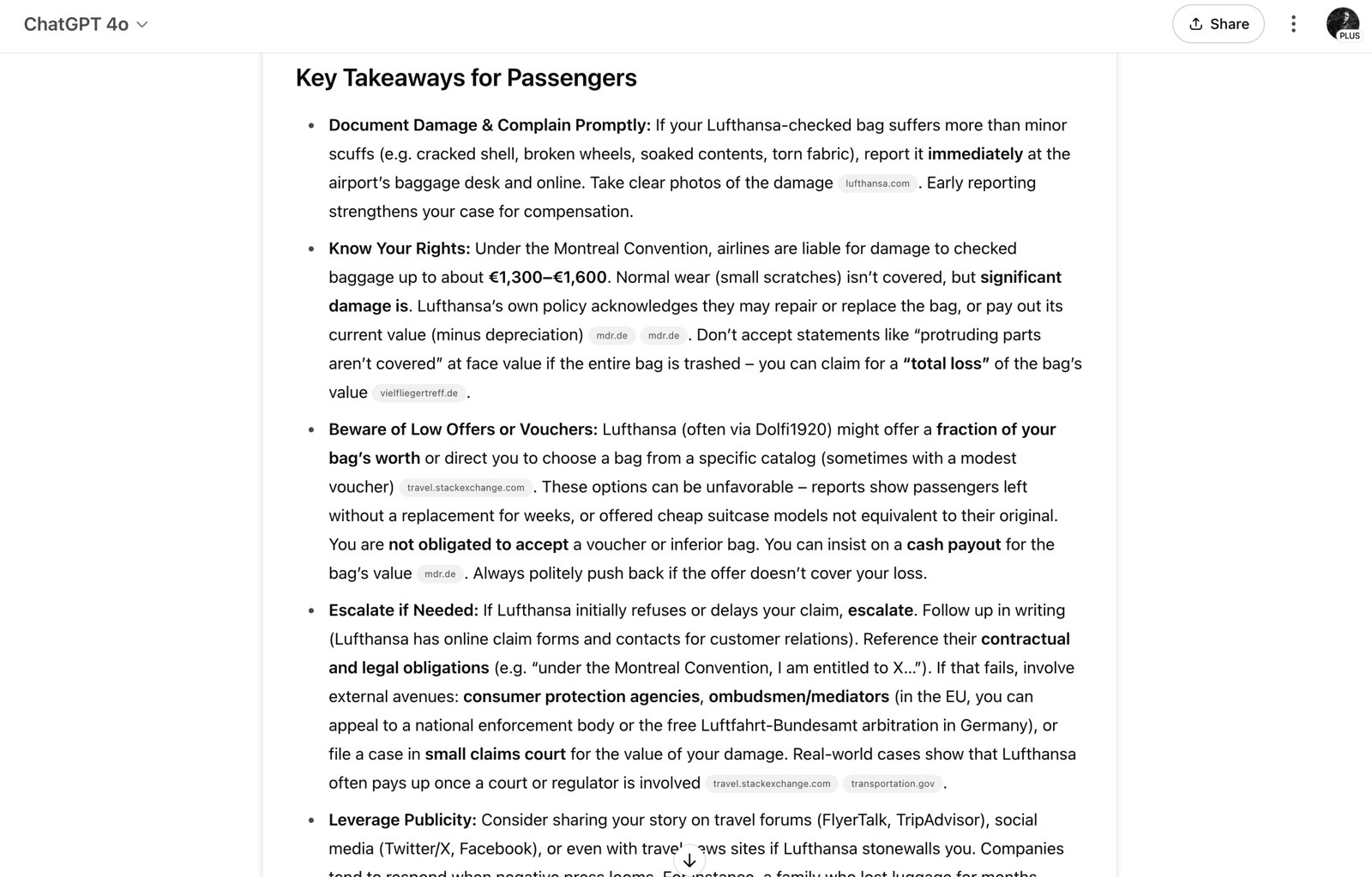
Such issues won’t be solved overnight, but patience is key. You’ll want to refuse any low-ball offers from Lufthansa and its representatives and ask for compensation according to international regulations that Lufthansa is a part of.
You should run similar Deep Research reports like mine for any airline failing to make up for damaging your checked-in luggage. The feature was available only to paid ChatGPT subscriptions, starting with the $20/month ChatGPT Plus.
But OpenAI made Deep Research available to ChatGPT Free accounts, so you can begin your report without paying anything. Then again, the $20/month subscription will get you a better-quality report, and it might be worth spending that money to get an airline to compensate you adequately for a bag they broke.








